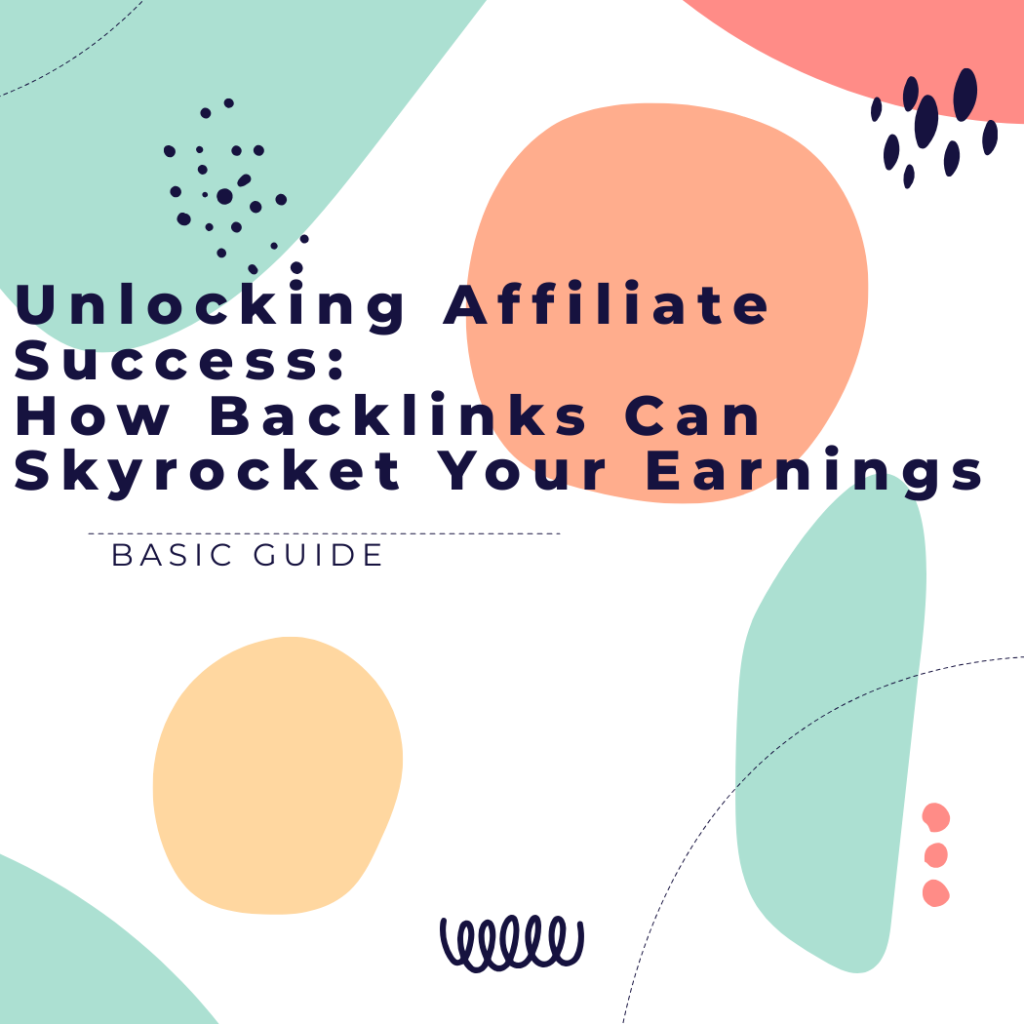
Discover how backlinks can elevate your affiliate marketing game. Learn effective strategies to build quality backlinks, improve your search engine rankings, and drive targeted traffic to boost your affiliate earnings.
In the competitive world of affiliate marketing, standing out and driving traffic to your site is crucial for success. One powerful way to achieve this is by leveraging backlinks. But what exactly are backlinks, and how can they boost your affiliate marketing earnings? Let’s dive in.
What Are Backlinks?
Backlinks, also known as inbound or incoming links, are links from one website to another. They are a critical factor in search engine optimization (SEO) because they signal to search engines that your content is valuable and authoritative. Essentially, each backlink acts as a vote of confidence from one site to another.
Backlinks can come from various sources, including blogs, news sites, forums, and social media platforms. The quality and relevance of these backlinks significantly impact your site’s SEO performance. High-quality backlinks from authoritative sites are particularly valuable as they can improve your search engine rankings and drive more targeted traffic to your affiliate content.
The Importance of Backlinks in Affiliate Marketing
- Improving Search Engine Rankings
- SEO Boost: Backlinks from reputable sites help improve your website’s search engine ranking. Google and other search engines view these links as endorsements, suggesting that your content is trustworthy and useful.
- Increased Organic Traffic: Higher search engine rankings mean more visibility in search results, leading to increased organic traffic to your site. Organic traffic is highly valuable for affiliate marketers because it is cost-effective and sustainable over the long term.
- Increasing Referral Traffic
- Direct Visitors: Quality backlinks from popular websites can bring direct referral traffic. Visitors coming from these links are often already interested in your niche, increasing the likelihood of conversions.
- Targeted Audience: Backlinks from niche-relevant sites ensure that the traffic you receive is more targeted and engaged with your affiliate content. This targeted audience is more likely to convert into paying customers, boosting your affiliate earnings.
- Building Authority and Trust
- Credibility: Backlinks from reputable websites enhance your site’s credibility. This builds trust with your audience, making them more likely to follow your recommendations and make purchases. Trust is a crucial factor in affiliate marketing, as users are more likely to convert when they trust the source of the information.
- Expertise: Consistent backlinks from industry leaders can position you as an authority in your field, further driving trust and engagement. Being seen as an expert can increase your influence and lead to higher conversion rates.
- Enhancing Content Discoverability
- Content Promotion: Backlinks help your content get discovered by a broader audience. Influencers and bloggers often share valuable content, expanding your reach. The more people who see your content, the more potential there is for affiliate conversions.
- Indexing: Search engine bots use backlinks to discover new pages, helping your content get indexed faster. Faster indexing means your content appears in search results more quickly, driving traffic and potential earnings sooner.
The Benefits of Backlinks for Affiliate Marketing
1. Search Engine Optimization (SEO) Benefits
Backlinks play a crucial role in improving your site’s search engine optimization (SEO). They act as signals of trust and authority to search engines like Google, influencing your site’s ranking in search results. Here are the key SEO benefits of backlinks:
- Higher Search Engine Rankings: Quality backlinks from authoritative sites can significantly improve your website’s ranking in search engine results pages (SERPs). When reputable sites link to your content, search engines interpret this as a vote of confidence, signaling that your site is trustworthy and relevant to users’ queries.
- Increased Organic Traffic: Improved rankings lead to increased organic traffic. Organic traffic refers to visitors who find your site through unpaid search results. It’s highly valuable for affiliate marketers because it represents users actively seeking information or products related to your niche.
- Long-Term SEO Value: Unlike paid advertising, which stops driving traffic once you stop paying, organic traffic generated by SEO is sustainable over time. By consistently building quality backlinks and optimizing your content, you can maintain and grow your organic traffic, reducing dependency on paid channels.
2. Referral Traffic Benefits
In addition to SEO benefits, backlinks also drive referral traffic to your affiliate site. Referral traffic refers to visitors who come to your site by clicking on a link from another website. Here’s how backlinks contribute to generating referral traffic:
- Targeted Audience: Backlinks from relevant, niche-specific websites attract visitors who are already interested in your industry or products. These visitors are more likely to engage with your content and convert into customers, boosting your affiliate earnings.
- Direct Visitors: High-quality backlinks from popular websites with large audiences can bring a significant influx of direct traffic. When users click on a backlink and visit your site, they’re more likely to explore your content or offers, increasing the chances of conversion.
- Building Relationships: Backlinks often stem from relationships with bloggers, influencers, or industry leaders. These relationships can lead to further collaboration opportunities, such as guest posting or joint promotions, expanding your reach and driving more referral traffic.
3. Authority and Trust Benefits
Establishing authority and trust is crucial for successful affiliate marketing. Backlinks from reputable sites contribute to building your site’s authority and trustworthiness in the following ways:
- Credibility: When authoritative websites link to your content, it enhances your site’s credibility. Users are more likely to trust recommendations or information presented on sites endorsed by respected sources.
- Expertise Recognition: Consistent backlinks from industry leaders or influencers validate your expertise in your niche. Being recognized as an expert enhances your reputation and encourages users to view you as a reliable source of information or products.
- Brand Perception: Backlinks from reputable sites improve your brand’s visibility and perception. As users encounter your brand on respected platforms, they develop a positive association with your products or services, enhancing brand trust and recognition.
4. Content Discoverability Benefits
Backlinks play a crucial role in promoting your content and increasing its visibility across the web. Here’s how backlinks enhance the discoverability of your affiliate content:
- Expanded Reach: When influencers, bloggers, or industry publications link to your content, it exposes your brand to their audiences. This exposure increases the reach of your content beyond your immediate followers or subscribers, attracting new visitors to your site.
- Viral Potential: High-quality content supported by backlinks has the potential to go viral. As more users discover and share your content through backlinked sources, it can generate significant buzz and traffic, amplifying your affiliate marketing efforts.
- Accelerated Indexing: Search engines use backlinks to discover new content and determine its relevance. Quality backlinks facilitate faster indexing of your pages, ensuring they appear in search results promptly. This accelerated indexing drives early traffic and visibility for new content initiatives.
Effective Strategies for Building Quality Backlinks
Building a strong backlink profile requires a strategic approach focused on acquiring high-quality links from relevant sources. Here are effective strategies to consider:
1. Guest Posting
Guest posting involves writing articles or blog posts for other websites in your industry or niche. By including a backlink to your site within the content or author bio, you can attract traffic and improve your site’s SEO. Here’s how to approach guest posting for backlinks:
- Identify Target Sites: Research websites that accept guest contributions in your niche. Look for sites with a strong domain authority (DA) and engaged audience relevant to your target market.
- Create Valuable Content: Develop high-quality, informative content that provides value to the target site’s audience. Craft articles that showcase your expertise while subtly promoting your affiliate offers or products.
- Include Relevant Backlinks: Incorporate natural, relevant backlinks within the guest post content. Anchor text should be descriptive and contextually appropriate, enhancing the user experience and SEO value.
- Build Relationships: Cultivate relationships with editors or site owners through professional communication and mutual respect. Establishing rapport can lead to recurring guest posting opportunities and expanded reach within your industry.
2. Content Marketing
Content marketing focuses on creating valuable, shareable content that naturally attracts backlinks. By producing high-quality content assets, such as comprehensive guides, infographics, or original research, you can encourage organic linking from other websites. Here’s how to leverage content marketing for backlinks:
- Create Link-Worthy Content: Develop content that addresses common industry challenges, provides in-depth insights, or offers unique perspectives. Content should be well-researched, visually appealing, and authoritative to attract backlinks naturally.
- Promote Content Proactively: Use social media, email newsletters, and influencer outreach to promote your content to a wider audience. Encourage sharing and linking by highlighting key takeaways or inviting feedback from industry peers.
- Monitor Performance: Track the performance of your content using analytics tools. Measure engagement metrics, such as social shares and backlinks, to identify successful content types and optimize future campaigns.
- Update and Repurpose: Maintain content freshness by updating existing assets with new information or insights. Repurpose successful content into different formats, such as podcasts or webinars, to reach diverse audience segments and attract additional backlinks.
3. Influencer Outreach
Influencer outreach involves collaborating with influential individuals or brands in your niche to secure backlinks and expand your reach. Influencers can endorse your products, mention your brand in their content, or contribute guest posts to your site. Here’s how to approach influencer outreach for backlinks:
- Identify Relevant Influencers: Research influencers whose audience aligns with your target market and brand values. Look for influencers with a strong online presence, engaged followers, and a track record of ethical collaboration.
- Craft Personalized Pitches: Tailor outreach messages to each influencer, highlighting mutual benefits and emphasizing the value of collaboration. Clearly articulate how your partnership can provide value to their audience and enhance their content offerings.
- Negotiate Backlink Placement: Discuss backlink placement options, such as within blog posts, social media profiles, or dedicated recommendation sections. Ensure backlinks are contextually relevant and seamlessly integrated into the influencer’s content.
- Build Long-Term Relationships: Foster ongoing relationships with influencers through transparent communication and mutual support. Collaborate on multiple campaigns or projects to maximize backlink opportunities and extend brand visibility.
4. Broken Link Building
Broken link building involves identifying broken or outdated links on reputable websites and offering to replace them with relevant, updated content from your site. This strategy allows you to earn backlinks by providing value through content restoration. Here’s how to implement broken link building for backlinks:
- Find Opportunities: Use SEO tools, such as Ahrefs or SEMrush, to identify broken links on authoritative sites within your niche. Focus on pages with high domain authority and relevance to your industry.
- Create Replacement Content: Develop high-quality content that addresses the same topic or provides an improved solution compared to the broken link. Ensure your content adds value and aligns with the site’s existing content structure.
- Reach Out to Webmasters: Contact site owners or webmasters to notify them of the broken link and offer your content as a replacement. Position your content as a valuable resource that enhances their site’s user experience and SEO.
5. Social Media Engagement
Social media platforms provide opportunities to engage with your audience, build relationships, and earn backlinks organically. By sharing valuable content, participating in industry discussions, and connecting with influencers, you can attract backlinks from social media profiles and increase your site’s visibility. Here’s how to leverage social media for backlinks:
- Share Valuable Content: Post informative articles, infographics, or videos that resonate with your audience and encourage sharing. Include backlinks to your site within social media posts to drive traffic and improve SEO.
- Engage with Influencers: Follow influencers and industry leaders on social media platforms. Comment on their posts, share their content, and contribute valuable insights to establish rapport and attract backlinks.
- Join Industry Conversations: Participate in relevant hashtags, Twitter chats, or LinkedIn groups to connect with peers and potential collaborators. Share expertise, answer questions, and provide valuable resources to position yourself as a trusted authority.
- Monitor Mentions and Shares: Use social media monitoring tools to track mentions, shares, and discussions related to your brand or content. Engage with users who share your content or link to your site, fostering relationships and encouraging further backlinking.
Tools and Resources for Building Backlinks
To effectively build and manage backlinks, you can leverage various tools and resources:
- Ahrefs
- Features: Ahrefs is a comprehensive SEO tool that provides insights into your backlink profile, competitor analysis, keyword research, and more.
- Benefits: Use Ahrefs to identify high-quality backlink opportunities, monitor your backlink profile, and analyze your competitors’ strategies.
- SEMrush
- Features: SEMrush offers a range of SEO tools, including backlink analysis, site audits, keyword research, and content marketing insights.
- Benefits: Use SEMrush to discover backlink opportunities, track your rankings, and optimize your overall SEO strategy.
- Moz
- Features: Moz provides tools for backlink analysis, keyword research, site audits, and more. Moz’s Link Explorer is particularly useful for analyzing your backlink profile.
- Benefits: Use Moz to identify high-quality backlinks, monitor your site’s SEO performance, and find link-building opportunities.
- Google Search Console
- Features: Google Search Console is a free tool that provides insights into your site’s performance in Google search, including your backlink profile.
- Benefits: Use Google Search Console to monitor your backlinks, identify issues, and optimize your site’s SEO.
- BuzzSumo
- Features: BuzzSumo helps you discover popular content and analyze its performance across social media and other platforms.
- Benefits: Use BuzzSumo to identify content that attracts backlinks and to find influencers who can help promote your content.
- Hunter.io
- Features: Hunter.io helps you find email addresses associated with websites, making it easier to reach out for link-building opportunities.
- Benefits: Use Hunter.io to connect with bloggers, influencers, and webmasters for guest posting, collaboration, and backlink requests.
Conclusion
Backlinks are a powerful tool in your affiliate marketing arsenal. By improving your search engine rankings, driving targeted traffic, and building authority and trust, backlinks can significantly boost your affiliate earnings. Implementing effective backlink strategies takes time and effort, but the payoff is well worth it. Start building quality backlinks today and watch your affiliate marketing success skyrocket!
Related articles
What is Affiliate Marketing and How Can It Benefit You in the Best way in 2024?
From Zero to Hero: Building Your Business with Proven Marketing Strategies

